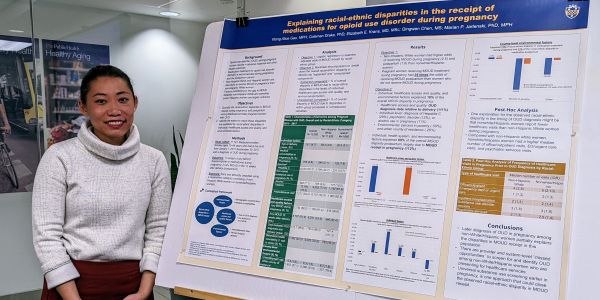
HPM student Alice Gao won third place among doctoral students for the project, “Explaining Racial-ethnic Disparities in the Receipt of Medication for Opioid Use Disorder During Pregnancy”.
Dean’s Day is an annual student research competition. Students present their research during multiple poster sessions while faculty members judge presentations for prizes and students evaluate posters for Grand Rounds credit.
Visit publichealth.pitt.edu/deansday to learn more about the competition and see a full list of winners.
Abstract
Objective: Factors contributing to racial and ethnic disparities in medication for opioid use disorder (MOUD) receipt during pregnancy are largely unknown. We quantified the contribution of individual, healthcare access and quality, and community factors to racial-ethnic disparities in MOUD during pregnancy and postpartum among Medicaid-enrolled pregnant women with OUD.
Methods: This retrospective cohort study used regression and nonlinear decomposition to examine how individual, healthcare access and quality, and community factors explain racial-ethnic disparities in MOUD receipt among Medicaid-enrolled women with OUD who had a live birth from 2011-2017. The exposure was self-reported race and ethnicity. The outcomes were any MOUD receipt during pregnancy or postpartum. All factors included were identified from the literature.
Results: Racial-ethnic disparities in individual, healthcare access and quality, and community factors explained 15.8% of the racial-ethnic disparity in MOUD receipt during pregnancy and 68.9% of the disparity in the postpartum period. Despite comparable healthcare utilization, nonwhite/Hispanic women were diagnosed with OUD 37 days later in pregnancy, on average, than non-Hispanic White women, which was the largest contributor to the racial-ethnic disparity in MOUD receipt during pregnancy (111.0%). The racial-ethnic disparity in MOUD receipt during pregnancy was the largest contributor (112.2%) to the racial-ethnic disparity in MOUD in the postpartum period.
Conclusions: Later diagnosis of OUD in pregnancy among nonwhite/Hispanic women partially explains the disparities in MOUD receipt in this population. Universal substance use screening earlier in pregnancy, combined with connecting patients to evidence-based and culturally competent care, is one approach that could close the observed racial-ethnic disparity in MOUD receipt.
5/09/2022